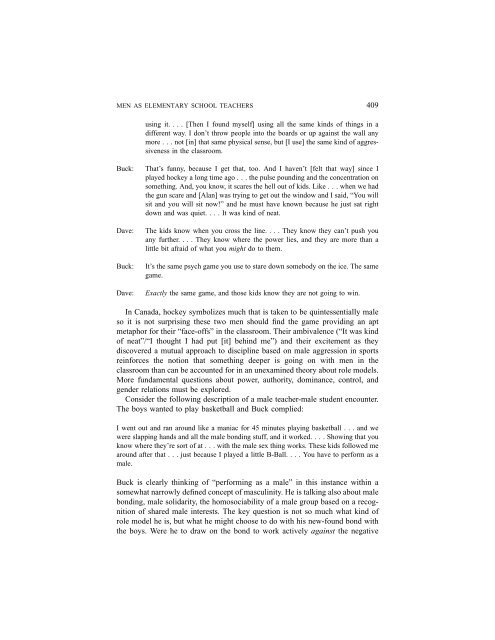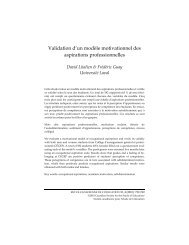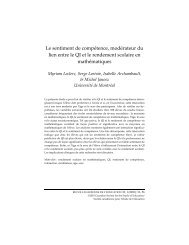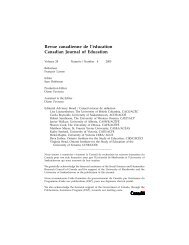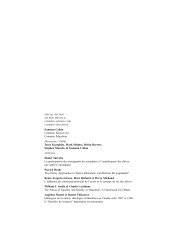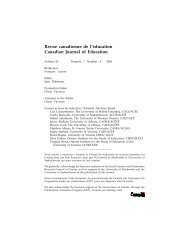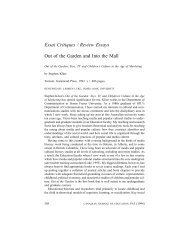Mireille Falardeau et Michel Loranger Le choix de stratégies ... - CSSE
Mireille Falardeau et Michel Loranger Le choix de stratégies ... - CSSE
Mireille Falardeau et Michel Loranger Le choix de stratégies ... - CSSE
You also want an ePaper? Increase the reach of your titles
YUMPU automatically turns print PDFs into web optimized ePapers that Google loves.
MEN AS ELEMENTARY SCHOOL TEACHERS 409<br />
using it. ...[Then I found myself] using all the same kinds of things in a<br />
different way. I don’t throw people into the boards or up against the wall any<br />
more . . . not [in] that same physical sense, but [I use] the same kind of aggressiveness<br />
in the classroom.<br />
Buck: That’s funny, because I g<strong>et</strong> that, too. And I haven’t [felt that way] since I<br />
played hockey a long time ago . . . the pulse pounding and the concentration on<br />
som<strong>et</strong>hing. And, you know, it scares the hell out of kids. Like . . . when we had<br />
the gun scare and [Alan] was trying to g<strong>et</strong> out the window and I said, “You will<br />
sit and you will sit now!” and he must have known because he just sat right<br />
down and was qui<strong>et</strong>. ...Itwaskind of neat.<br />
Dave: The kids know when you cross the line. ...They know they can’t push you<br />
any further. ...They know where the power lies, and they are more than a<br />
little bit afraid of what you might do to them.<br />
Buck: It’s the same psych game you use to stare down somebody on the ice. The same<br />
game.<br />
Dave: Exactly the same game, and those kids know they are not going to win.<br />
In Canada, hockey symbolizes much that is taken to be quintessentially male<br />
so it is not surprising these two men should find the game providing an apt<br />
m<strong>et</strong>aphor for their “face-offs” in the classroom. Their ambivalence (“It was kind<br />
of neat”/“I thought I had put [it] behind me”) and their excitement as they<br />
discovered a mutual approach to discipline based on male aggression in sports<br />
reinforces the notion that som<strong>et</strong>hing <strong>de</strong>eper is going on with men in the<br />
classroom than can be accounted for in an unexamined theory about role mo<strong>de</strong>ls.<br />
More fundamental questions about power, authority, dominance, control, and<br />
gen<strong>de</strong>r relations must be explored.<br />
Consi<strong>de</strong>r the following <strong>de</strong>scription of a male teacher-male stu<strong>de</strong>nt encounter.<br />
The boys wanted to play bask<strong>et</strong>ball and Buck complied:<br />
I went out and ran around like a maniac for 45 minutes playing bask<strong>et</strong>ball . . . and we<br />
were slapping hands and all the male bonding stuff, and it worked. ...Showing that you<br />
know where they’re sort of at . . . with the male sex thing works. These kids followed me<br />
around after that . . . just because I played a little B-Ball. ...Youhave to perform as a<br />
male.<br />
Buck is clearly thinking of “performing as a male” in this instance within a<br />
somewhat narrowly <strong>de</strong>fined concept of masculinity. He is talking also about male<br />
bonding, male solidarity, the homosociability of a male group based on a recognition<br />
of shared male interests. The key question is not so much what kind of<br />
role mo<strong>de</strong>l he is, but what he might choose to do with his new-found bond with<br />
the boys. Were he to draw on the bond to work actively against the negative


